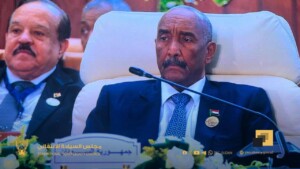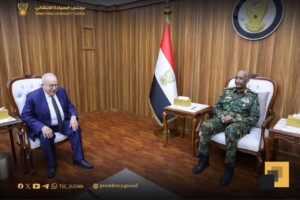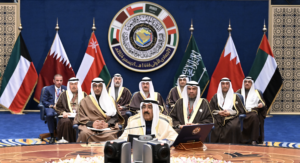Sudan rebels, govt discuss Government of Peace formation
The leaders of the Sudan Revolutionary Front (SRF) rebel alliance who arrived in Khartoum on Sunday held meetings with ministers regarding the formation of a new ‘Government of Peace’.
 JEM leader Jibril Ibrahim at SUNA yesterday (SUNA)
JEM leader Jibril Ibrahim at SUNA yesterday (SUNA)
The leaders of the Sudan Revolutionary Front (SRF) rebel alliance who arrived in Khartoum on Sunday held meetings with ministers regarding the formation of a new 'Government of Peace'.
The power-sharing agreement signed by the transitional government and the SRF on October 3 in Juba stipulates that 25 per cent of the transitional government seats will be allocated to “the peace partners”, meaning the armed rebel movements that signed the peace accord. This comes down to three seats in the Sovereign Council and five ministers.
At a joint press conference with leaders of the Forces of Freedom and Change (FFC) at the premises of Sudan News Agency (SUNA) yesterday, Malik Agar, Vice President of the SRF and Chairman of the Sudan People’s Liberation Movement-North faction in Blue Nile state (SPLM-N Agar), affirmed that he supports the unity of Sudan.
Self-determination of the Two Areas (South Kordofan and Blue Nile state) comes within the framework of a unified Sudan, he stated. “Fragmentation of the country must be prevented.” A single professional Sudanese army will be formed and consist of all armed forces in the country.
SRF President El Hadi Idris called on “the FFC, all other revolutionary forces, and the military leadership to address all their differences for the sake of rebuilding Sudan”.
The head of the Sudanese Justice and Equality Movement (JEM), Dr. Jibril Ibrahim, stated yesterday that he does not seek revenge against anyone. By signing the peace agreement we have overcome the bitterness of the past, he said. JEM has been fighting to build a better society and a Sudan that can accommodate everyone. Justice must be served, and those affected by the war must be compensated.
Ibrahim said that the money spent on the war in the past will in the future be spent on providing services and realising development, so that four million displaced can return to their areas of origin in Darfur.
Eastern Sudan framework
The negotiators of the disputed eastern Sudan track in the Juba Peace Agreement, emphasised they would immediately give up their positions if “one drop of blood is shed among the eastern Sudanese”.
Osama Saeed, head of the Opposition Beja Conference, said they reach out to those who reject the eastern Sudan track accord. He stated that the deal provides the constitutional and legal framework for a comprehensive Eastern Sudan Conference, and guarantees the participation of the eastern Sudanese people in the government. A new $348 million fund will be established for the reconstruction of eastern Sudan.
“The peace accord eliminates political and economic marginalisation,” Saeed said. Thirty per cent of its revenues from oil and mineral resources will be allocated to eastern Sudan (Red Sea state, Kassala, and El Gedaref). A joint mechanism will be formed to determine the percentage of the revenues from the eastern Sudan ports and agriculture that will be allocated to these three states.
Khaled Idris, head of the Popular Front for Liberation and Justice, said that the East track agreement is beneficial for all citizens in eastern Sudan. He described the agreement as “strong” and said it does not contain the “mistakes” of the 2006 Asmara East Sudan Agreement. He called upon everybody to actually read the eastern Sudan track peace accord. He also urged all parties to sign it, “as there is no peace without consensus”.
Northern Sudan gains
Mohamed Bandak, head of the Kush Liberation Movement, justified that the five Darfur states will be allocated more power than the northern region, which consists of River Nile state and Northern State. He denied that the share for Darfur has been taken from the share of the northern states. Bandak stated that the most basic living conditions are not present in Darfur, which justifies positive discrimination.
The northern Sudan accord delivers great gains for the region, he said. Among them are the cancellation of decisions made during the rule of ousted President Al Bashir regarding farmlands, a review of the contracts with agricultural companies to cultivate lands in the region, an assessment of all mining activities, and accountability for those involved in the Kajbar killings in June 2007.
Pitfalls
Omar El Degeir, head of the Sudanese Congress Party, a driving force behind the Forces for Freedom and Change, appealed to Abdelaziz El Hilu, head of the Sudan People’s Liberation Movement-North, and Abdelwahid El Nur, leader of the mainstream Sudan Liberation Movement, to join the peace negotiations as soon as possible.
He acknowledged that the situation in the country is “far from good” and pointed to “the many pitfalls on the revolutionary track and the mistakes made that need correction”.
El Degeir called for “an expansion of the political base for the transitional process to democracy”. The FFC is to be restructured to include all forces of the revolution, he said.
He called on the National Umma Party to lift the suspension of its FFC membership, and on the Communist Party of Sudan to review their decision to withdraw from the FFC. The Sudanese Professionals Association should “unify its ranks”, he said.
Radio Dabanga’s editorial independence means that we can continue to provide factual updates about political developments to Sudanese and international actors, educate people about how to avoid outbreaks of infectious diseases, and provide a window to the world for those in all corners of Sudan. Support Radio Dabanga for as little as €2.50, the equivalent of a cup of coffee.












 and then
and then